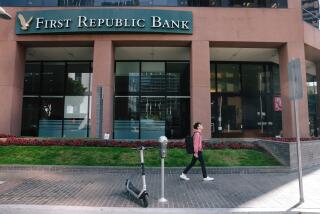Top banks drop plan for big bailout fund
- Share via
The three top U.S. banks said they dropped a government-supported plan for a fund as large as $80 billion to bail out so-called structured investment vehicles after Citigroup and others launched independent rescues, making the fund unnecessary.
The retreat from the “super-SIV” planned by Citigroup, Bank of America Corp. and JPMorgan Chase & Co. wasn’t surprising to many analysts, who said the fund was a flawed idea and would have been difficult to execute.
But the lack of demand for a super-SIV fund was seen as a positive in jittery money markets, where credit has been tight.
“It’s akin to not having to use your insurance policy -- the reasons for the fund to be there have gone away, which is good news for the money markets,” said Peter Crane, who tracks the money fund industry at Crane Data in Westboro, Mass.
SIVs borrowed money by selling short-term debt and used the proceeds to buy higher-yielding long-term debt, including mortgage-related holdings.
But as the sub-prime crisis worsened, funds found it hard to roll over, or refinance, their short-term debt.
Many banks and investors had feared SIVs would dump their long-term bonds into financial markets, creating a fixed-income glut that could have driven up borrowing costs.
The super-SIV fund would have offered to buy mortgage-tainted assets from SIVs.
The banks said Friday that feedback from possible financiers and users of the fund indicated it was no longer necessary because SIVs were selling assets on their own, finding other ways to raise money or otherwise restructuring.
The U.S. Treasury hosted discussions about the fund, but many analysts even at the time doubted that it would work because it was not clear why investors who had lost faith in the assets in one structured vehicle would be more comfortable with the same assets in a different vehicle.
More to Read
Inside the business of entertainment
The Wide Shot brings you news, analysis and insights on everything from streaming wars to production — and what it all means for the future.
You may occasionally receive promotional content from the Los Angeles Times.










